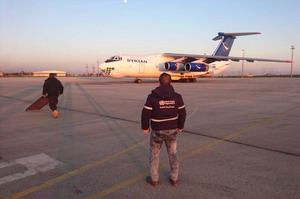 An airplane carrying WHO 28 tonnes of medical supplies landing at Al-Qamishli airport in Al-Hasakeh governorate in north-east Syria today. Photo: WHO/Syria 201923 January 2019 – Today, the World Health Organization (WHO) airlifted more than 28 tonnes of medical supplies, equipment and vaccines to Al-Hasakeh governorate to respond to growing health needs in north-east Syria. This is the second shipment the Organization has airlifted to Al-Hasakeh this month. A first shipment of 20 tonnes of medical supplies was airlifted to the governorate on 8 January 2019.
An airplane carrying WHO 28 tonnes of medical supplies landing at Al-Qamishli airport in Al-Hasakeh governorate in north-east Syria today. Photo: WHO/Syria 201923 January 2019 – Today, the World Health Organization (WHO) airlifted more than 28 tonnes of medical supplies, equipment and vaccines to Al-Hasakeh governorate to respond to growing health needs in north-east Syria. This is the second shipment the Organization has airlifted to Al-Hasakeh this month. A first shipment of 20 tonnes of medical supplies was airlifted to the governorate on 8 January 2019.
The shipment contains supplies to treat trauma patients and medicines to cover more than 106 000 medical treatments. Items include emergency medical kits, antibiotics and antibacterials, intravenous fluids and anti-asthma and chronic disease medicines. Equipment includes incubators, ventilators, electrocardiographs, generators, haemodialysis machines, patient monitoring devices, defibrillators and anaesthesia machines. In addition, 140 000 vaccines against polio, tuberculosis, tetanus, MMR and hepatitis, as well as vitamin A supplements, were airlifted to strengthen childhood vaccination efforts. The items will be distributed to hospitals and primary health care centres in the 3 north-eastern governorates of Al-Hasakeh, Ar-Raqqa and Deir-ez-Zor.
“Hundreds of thousands of Syrians in the northeast are in desperate need of health care services”, said Elizabeth Hoff, WHO Representative in Syria. “The health system in all 3 governorates has been badly disrupted, and the situation is compounded by the high numbers of internally displaced people living in dire conditions in camps and settlements. In addition to strengthening hospitals and health care centres, we are focusing on supporting the vaccination of children in north-east Syria, where vaccination coverage rates remain critically low.”
The supplies were procured using generous contributions from the Government of Norway, the Government of Japan, UK Aid and the United States Agency for International Development (USAID).



